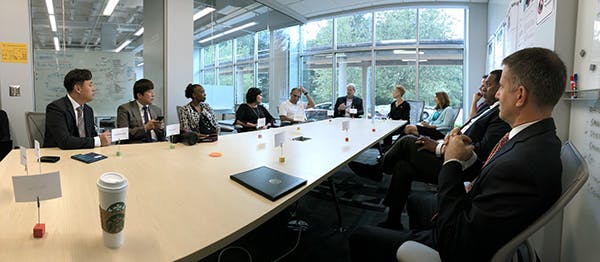Official partnership paves way for South Korean collaborations
A new memorandum of understanding between the University of Georgia College of Education and Daegu National University of Education in South Korea has opened the door to new partnerships on both sides of the Pacific Ocean.
The cooperative agreement was signed earlier this month during a ceremony at the College of Education's Research and Innovation in Learning (RAIL) Lab. It will help bring South Korean university students to a top American university to learn lessons in robotics and virtual reality—two projects undertaken at the RAIL Lab—and deliver them to K-12 students in South Korea.
 Youngkwon Bae, dean of planning affairs and professor in the department of computer education at Daegu National University, or DNUE, said students in South Korea want to experience American university life and learn first-hand how university students learn and how they are taught. But, he added, it's also an opportunity to gain insight into some of the unique education-focused projects undertaken by RAIL.
Youngkwon Bae, dean of planning affairs and professor in the department of computer education at Daegu National University, or DNUE, said students in South Korea want to experience American university life and learn first-hand how university students learn and how they are taught. But, he added, it's also an opportunity to gain insight into some of the unique education-focused projects undertaken by RAIL.
The lab, which is housed at the College's River's Crossing building, uses a collaborative, interdisciplinary approach to design scalable projects in response to particular educational problems. For example, RAIL's robotics curriculum, which was developed several years ago to introduce elementary students to science, technology, engineering and mathematics concepts, has now been translated into several languages and is in place at schools in Asia, Africa and Central America. As the program grows, the RAIL team is constructing a global framework to connect students around the world as they support each other through problem solving.
"In the lab, they are looking at new ways to innovate and learn, and we want to share that experience," said Bae. "We are excited by this collaborative opportunity and this is a very basic step, but we will continue moving forward."
As part of the presentation, Ikseon Choi, RAIL director and professor in the department of career and information studies, gave attendees an overview of the projects now undertaken by the lab. All are linked by the use of technology and a focus on education, but vary in their goals and audiences. For example, one project uses case-based learning, through video modules, to teach medical students from real-world scenarios. Another uses virtual reality to provide a safe environment for children to learn pedestrian safety. Other projects work to support training among science research clinicians or disseminate basic education modules for children in under-developed areas.
Choi specifically pointed out the STEM-integrated robotics curriculum and the virtual reality pedestrian safety program, called SAVE4Youth, as opportunities for more partnerships with the South Korean university. "We would like Daegu National University of Education to be a hub for disseminating these programs in South Korea," he said.
While robotics addresses STEM education, Choi noted that SAVE4Youth addresses a growing concern in Asia. "We implemented our first VR pedestrian education program for children in Korea last summer through collaboration with Dr. Bae," said Choi. "This MOU will enhance this current collaboration to create a significant impact on the Asian community."
The next steps for the project include using RAIL's STEM robotics curriculum to develop professional development programs for in-service and pre-service teachers. This will involve faculty and student exchanges between the universities.
"That's why we have the lab here—to promote these kinds of partnerships and collaborations," said department head Robert Branch. As he spoke, he motioned to the label above the group's conference table—the "innovation" room. "We need to keep talking; this is in 'innovation,' but we need to move this over to 'implementation.'"
